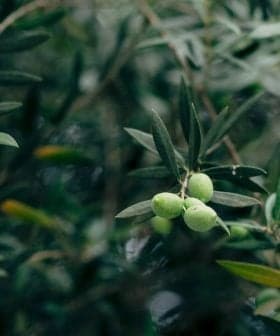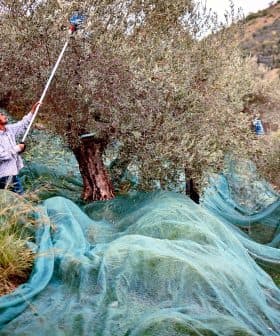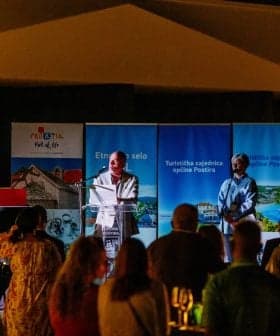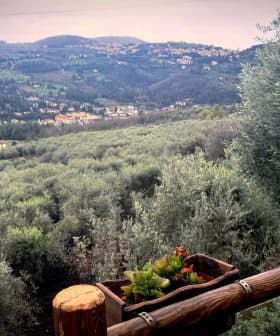New Rules in Italy Set Standards for Oleotourism Operators
The rules create guidelines for certified operators two years after oletourism's inclusion in the national budget.
New technical rules have been signed by the Italian government to support oleotourism, providing opportunities for olive farmers and producers to prosper throughout Italy. The rules aim to promote extra virgin olive oil culture, establish professional standards for tourism operators, and offer new sources of income for producers facing challenges such as extreme weather events and the Covid-19 pandemic. The initiative has been met with enthusiasm in the industry, with plans to develop further activities to showcase the rich diversity and opportunities in the olive oil world.
New opportunities for tourism connected to extra virgin olive oil have come one step closer for Italian olive farmers and producers.
The government has signed new technical rules, which officials say will allow oleotourism to prosper throughout Italy.
New, very interesting scenarios are opening up for the olive territories and producers.
The rules come on the heels of oleotourism’s inclusion in the national budget in 2020 and the meetings that followed among stakeholders, including farmers’ and producers’ associations.
The new decree sets out a series of standards that potential operators would need to meet to become a registered oleotourism venue, including the space to offer tastings and the ability to meet safety and sanitary regulations.
See Also:Centonze, a Forward-Looking Farm Rooted in Sicily’s HistoryThe stated goals of the new rules are to advance and promote extra virgin olive oil culture and serve as a new source of income for producers who have faced challenging years due to extreme weather events, drought and the Covid-19 pandemic.
The rules seek to establish professional standards among tourism operators, while also serving to define who will benefit from new funds earmarked by the 2020 budget law.
The focus of the new act is specifically on extra virgin olive oil products certified by the European Union with a Protected Designation of Origin (PDO) or Protected Geographical Indication (PGI).
Tourists will be offered the chance to learn about making and tasting extra virgin olive oil and experiences such as participating in harvest activities managed by trained personnel on the farms.
According to the new rules, tastings and courses may include small food preparations. Producers will also need to be accessible online using dedicated websites written in Italian and at least one other language.
Some producers had asked for a quality logo to be introduced to identify and certify only authorized oleotourism farmhouses, which the Ministry of Tourism and the Ministry of Agriculture plans to promote, yet the details of such a campaign were not offered.
The new rules were greeted with enthusiasm by many in the industry.
“We are today celebrating news that we have been waiting for some time,” Michele Sonnessa, president of the Città dell’Olio association, which coordinates hundreds of municipalities in olive-producing territories, told Olive Oil Times.
Sonnessa added that the next steps in deploying the initiative sit with the regional authorities.
“They now have the most relevant task, which is to adapt the local regulations to the guidelines fixed by the decree about requirements and quality standards for the new oleotourism activities,” he said.
“For extra virgin olive oil producers, this means the chance to receive dedicated training and create an increasingly more qualified offer of food and experiences,” Sonnessa added.
Together with other prominent farmers’ associations, such as Unaprol and Coldiretti, Città dell’Olio has just concluded the national olive oil tourism competition, which the Ministry of Agriculture had also promoted to highlight the best projects currently in the field.
“It’s a small step forward, which will be followed by other initiatives in the spring such as Merenda nell’Oliveta, or next fall’s Olive Walk, a series of activities to promote the rich diversity and the opportunities of the olive oil world,” Sonnessa said.
Among the winners of this year’s competitions was Alessandro Gilotti, the owner of the Passo Palomba farm, for his experience named Tutorial.
“It is targeted at the specific backgrounds of those who come to our olive farm,” he told Olive Oil Times. “The first step happens outdoor among the olive trees, where tourists get in touch with the characteristics of the trees, their pruning, their cultivars.”
“The fact that hundreds of different olive tree varieties have been grown by farmers everywhere is always so interesting for our visitors,” Gilotti added, noting how oleotourists welcome the wide variety of experiences.
“After the first contact with our trees, I bring them over to our small museum where they admire an old millstone, dated in the first years of the 18th Century,” he continued. “I show them a decanter from 1640, an excavated stone where the olive paste was poured. And I get to tell them about the ancient history of the olive tree. Finally, I show them ancient jars used for trading olive oil in the Mediterranean.”
The experience might dive deeper with discussions of chemistry and biochemistry. A particular focus is given to polyphenols and antioxidants and how they build up in the olive drupes during ripening.
“We also get to discussions about the containers and how they were in the past and how they are made today, when a given cultivar should be harvested and so on,” Gilotti added.
Gilotti is convinced that the experience can be especially enriching for children, allowing them to learn how extra virgin olive oil can play a role in their health as they grow.
“We play games with them,” Gilotti said. “One of those being a castle with a princess. Extra virgin olive oil represents the princess, and the castle is represented by a bottle. The drawbridge is its cork.”
“In that scenario, the soldiers are the polyphenols which have to protect the princess from three monsters called light, high temperatures and oxygen, the three enemies of high-quality extra virgin olive oils,” he added. “So they learn that the more soldiers there are, the more the princess is protected.”
See Also:Olive Oil Tourism VenuesThrough the tastings, Gilotti said many discover for the first time the difference between lower quality olive oil and truly high-quality extra virgin olive oils.
“At first, I let them smell different aromas, such as those from pieces of apples, recently mowed grass, tomatoes or other extra virgin olive oil scents,” he said. “Then they smell some rancid olive oil, or oil with typical defects, and that is when someone comes up saying that the smell reminds him or her of the olive oil they are currently using at home.”
“From there, I can teach them how to read a label correctly, what kind of information is there and I tell them the difference between olive oil types and qualities,” Gilotti added.
Gilotti said tourists describe the Tutorial experience as an “eye-opener” about olive oil.
“It ends with the tasting of our high-end monovarietals, discussions about what kind of extra virgin olive oil is best suited for specific recipes and a brief visit to our own modern olive oil mill,” he concluded. “After that, many of them buy our extra virgin olive oils.”
According to David Granieri, Unaprol’s president, oleotourism paves the way to a new age for Italian extra virgin olive oils.
“New, very interesting scenarios are opening up for the olive territories and producers,” he said. “We can give value to this extraordinary product directly reaching the consumers by narrating stories, bonds, emotions of the producers and from the production territories.”
The House of Representatives Agricultural commission president, Filippo Gallinella, added in a press release that these rules help support the countries myriad small farmers and producers who cannot always “ensure a sufficient income.”
“We produce half the olive oil we consume, with relevant exports, but have small farms and many oil mills scattered through the territory,” he said. “If we start working on marketing policies not focused on the shelf but centered on the consumer, dredging the consumers in the history, taste and wide biodiversity of our olive oils, then we will be able to ensure a decent income even to those who have just one hectare.”
“That is the big challenge to give value to the work of the farmer, caretaker of his or her territory,” Gallinella concluded.
Share this article









